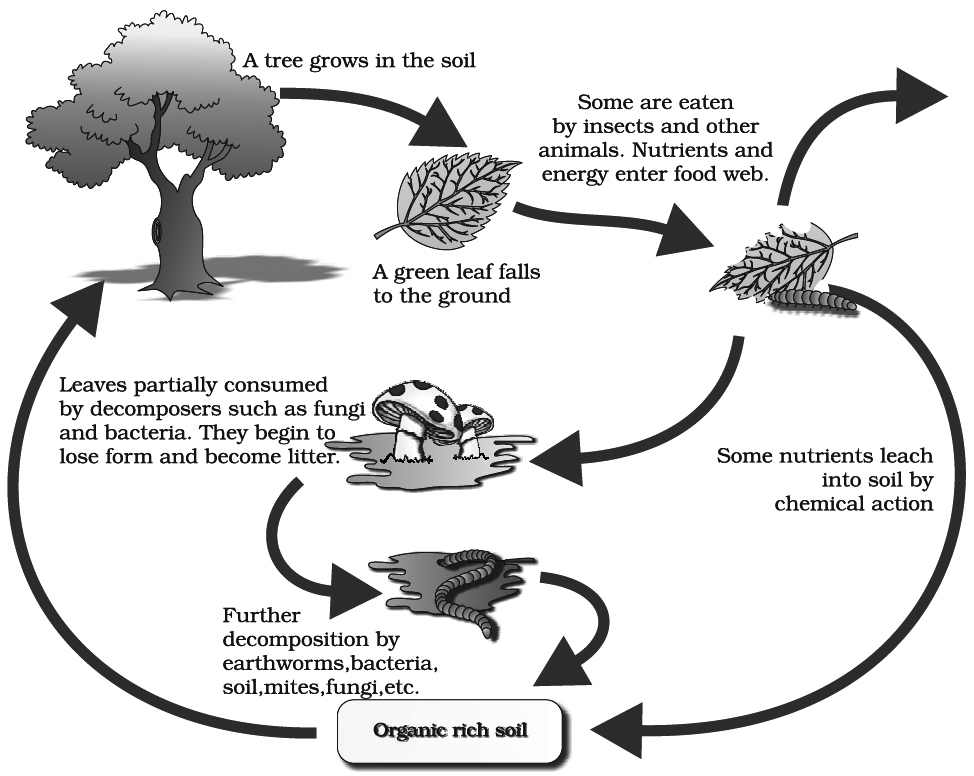- Books Name
- A TEXT OF BIOLOGY - CLASS XII
- Publication
- ACME SMART PUBLICATION
- Course
- CBSE Class 12
- Subject
- Biology
Decomposition
It is the process of physical and chemical breakdown of complex organic remains by organisms called decomposers, so as to produce inorganic raw materials (CO2, H2O, minerals, etc.) for recycling.
The major site for decomposition is the upper layer of soil in terrestrial habitats and bottom of water bodies.
Freshly deposited organic matter constitutes raw material and is called litter.
Detritus is degrading dead organic matter and is differentiated into above ground and below ground detritus.
Above ground detritus consists of dried plant parts (leaves, twigs, bark, flowers), excreta and dead remains of animals.
Below ground detritus is also called root detritus, because it is mainly composed of dead roots.
Underground organisms and their excreta also form a part of below ground detritus.
Decomposition Processes
Three types of processes occur simultaneously during decomposition of detritus, viz. fragmentation, leaching and catabolism.
1. Fragmentation of Detritus: Small invertebrate animals called detrivores feed on detritus, e.g., Earthworms, termites. They bring about its fragmentation. A part of detritus eaten by detrivores comes out in highly pulverised state in their faeces. Due to fragmentation during eating and pulverisation in digestive tracts, detritus is changed into fine particles which have a large surface area.
2. Leaching: Part of soluble substances present in the fragmented and decomposing detritus (e.g., sugars, inorganic nutrients) get leached to upper layers of soil by percolating water.

3. Catabolism: It is carried out by saprotrophic bacteria and fungi. They secrete digestive enzymes over the fragmented detritus. The enzymes change complex organic compounds into simple compounds. Inorganic substances are also released in the process.
The rate of catabolic action or breakdown of different complex substances is different.
This differential decomposition produces two substances, humus and inorganic nutrients in processes respectively called humification and mineralisation, which occurs in soil.
(i) Humification. It is the process of partial decomposition of detritus to form humus. Humus is a dark coloured, amorphous, partiaily decomposed organic matter rich in cellulose, lignin, tannins, resin, etc. and is highly resistant against microbial action. It undergoes decomposition at an extremely slow rate. Humus is slightly acidic, colloidal and functions as reservoir of nutrients.
(ii) Mineralisation. It is the release of inorganic substances (e.g., CO2, H2O, minerals) from organic matter during the process of decomposition. They are formed alongwith simple and soluble organic substances when digestive enzymes are poured over organic matter by saprotrophic microbes.
Factors Affecting Decomposition
The rate of decomposition of detritus is controlled by a number of factors.
(i) Chemical Nature of Detritus. Decomposition of detritus is slow if it contains lignin, chitin, tannins (phenolics) and cellulose. It is rapid if detritus possesses more of nitrogenous compounds (like proteins, nucleic acids) and water soluble reserve carbohydrates.
(ii) Soil pH. Detrivores are fewer in acidic soils. Microbial activity is also low in such soils. Therefore, rate of decomposition of organic matter is slow in acidic soils. Partially decomposed organic matter piles up over such soils. Detrivores are abundant in neutral and slightly alkaline soils, while decomposer microbes are rich in neutral and slightly acidic soils.
(iii) Temperature. At a temperature of more than 25°C, decomposers are very active in soils having good moisture and aeration. In humid tropical regions, it does not take more than 3 – 4 months for complete decomposition of detritus. However under low temperature conditions (>10°C) of soils, the rate of decomposition is very slow even if moisture and aeration are optimum.
(iv) Moisture. An optimum moisture helps in quicker decomposition of detritus. Reduction in moisture reduces the rate of decomposition as in areas of prolonged dryness like tropical deserts where, otherwise, the temperature is quite high. Excessive moisture also impedes decomposition. Temperature and soil moisture are the most important climatic factors that regulate decomposition through their effects on the activities of soil microbes.
(v) Aeration. It is required for activity of decomposers and detrivores. A reduced aeration will slow down the process of decomposition.

 ACME SMART PUBLICATION
ACME SMART PUBLICATION
